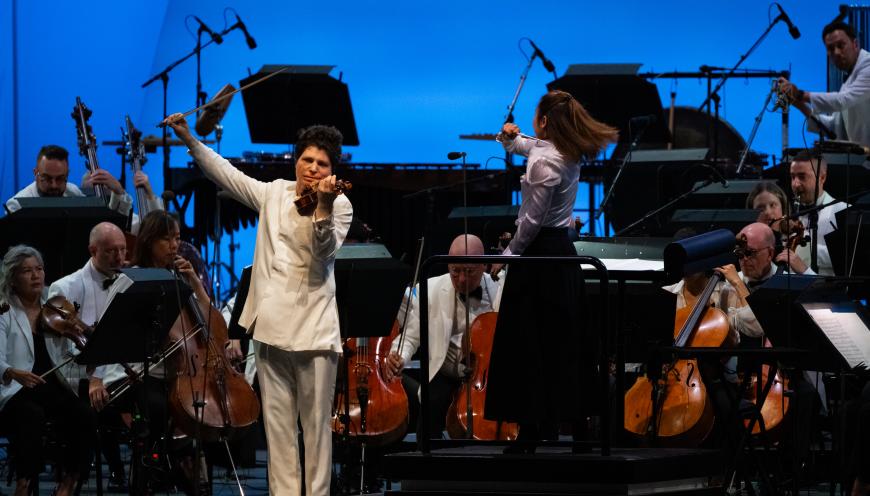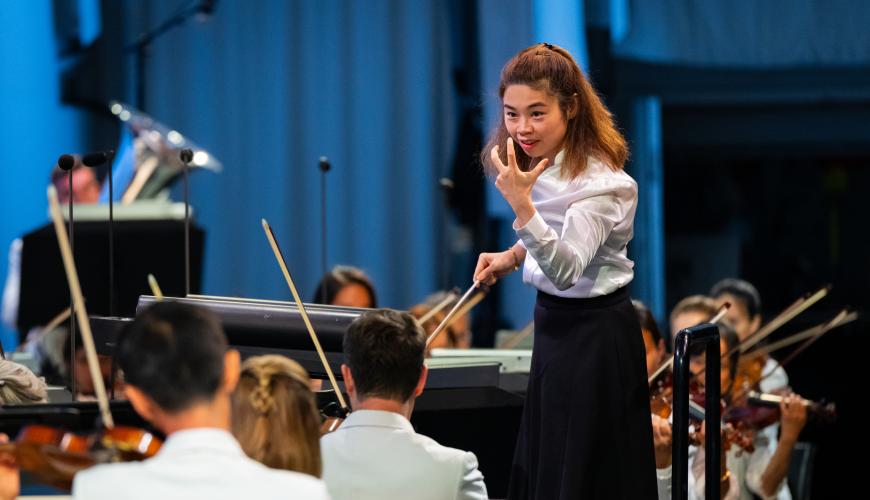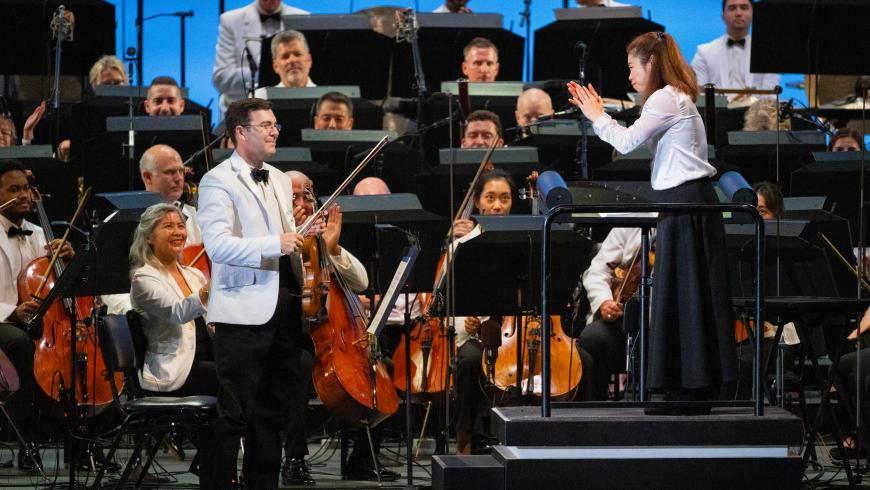
With apologies to the title of the first movement of Gustav Mahler’s Symphony No. 3, “summer marches in” was the order of the day on July 9 as the classical season at the Hollywood Bowl began with a concert of orchestral razzle-dazzle.
The food outlets and gift shops in the grand old facility once known as Daisy Dell were open for business. The security screening was less disruptive thanks to metal detectors that didn’t require everyone to empty their pockets and bags. Even the traffic flow outside the Bowl seemed lighter, with Lot C and part of Lot B now repurposed for drop-offs, pickups, and shuttles. With all this amid a never-ending national heat wave, summer was indeed marching in.
The music gave a glimpse of a possible future for the resident Los Angeles Philharmonic. The occasion was a return visit by Elim Chan, the Hong Kong-born conductor who may be a contender for the job of succeeding Gustavo Dudamel as music director after he leaves for the New York Philharmonic in 2026. As reported here before, some members of the orchestra have been impressed by Chan’s previous appearances — and she did nothing to dispel this listener’s good impressions on Tuesday night. She remains a source of musicality, energy, and grace, able to rev up the LA Phil to a level at or near its peak.

Again, as she did last fall at Disney Hall, Chan began her program with a short, fizzing curtain-raiser by a living female composer. In this case, it was Unsuk Chin’s subito con forza — an Italian musical indication that means “suddenly with power” — written for Beethoven’s 250th birthday commemorations in 2020, defying the pandemic at the time. Chin quotes the stern opening of Beethoven’s Coriolan Overture before fracturing it with a percussion crash. That bit of mischief is followed by creepy violins, a furious moto perpetuo passage, solos on the timpani and piano, brasses blasting on one note — one quick change after another. It’s a wild piece that packs a lot of action into its five minutes, and it gets even louder before finally resolving into a smooth, calm minor chord.
Violinist Augustin Hadelich, playing the opening notes of Sergei Prokofiev’s Violin Concerto No. 2 with exquisite phrasing and a pure, full, beautifully projected tone, let us know we were in good hands from the outset. Already outstanding when he appeared as a last-minute substitute at the Bowl in this same piece in 2008, Hadelich’s interpretation has grown even deeper with age and experience.
On Tuesday, he maintained a steady grip on the lyrical line of the slow movement, and he dug into the rhythms of the finale without forcing his tone, even as his playing grew ever more intense down the stretch. Chan’s conducting was pointed, precise, and in close touch with the rhythms, the subito con forza quality of Chin’s piece still in force with Prokofiev. It was a most distinguished performance. Hadelich capped off his appearance with a humorous encore of dazzling country fiddling in an uproarious fantasy on the tune “Orange Blossom Special.”

In Nikolai Rimsky-Korsakov’s Scheherazade, there was another estimable violinist in the spotlight, the LA Phil’s Nathan Cole. Cole had supposedly left the orchestra to become concertmaster of the mighty Boston Symphony, starting last weekend at Tanglewood, yet he remains listed in the latest program book as the LA Phil’s first associate concertmaster. A spokesperson for the Phil said that Cole will remain with the orchestra through the 2024–2025 season, splitting his time between Boston and L.A.
With Scheherazade, Cole made the most of his extensive solo opportunities, producing a seductive tone with an edge that softened as the piece progressed. He will be greatly missed when he ultimately leaves.
For Chan, the task was to get the orchestra excited about this overly repetitious showpiece, and she managed to pull it off with considerable verve and swagger. Her phrasing was carefully considered in the lyrical passages of the third movement, heading crisply toward the shipwreck episode. She continues to display a good beat with the right hand, and on Tuesday, she shifted the baton to the palm of her left hand as she shaped the third movement’s rhetoric expressively. Again, she was able to get a lot out of this orchestra on short rehearsal time. That should factor into a decision about the next music director.




